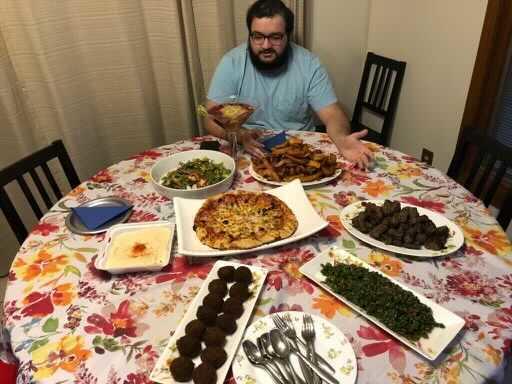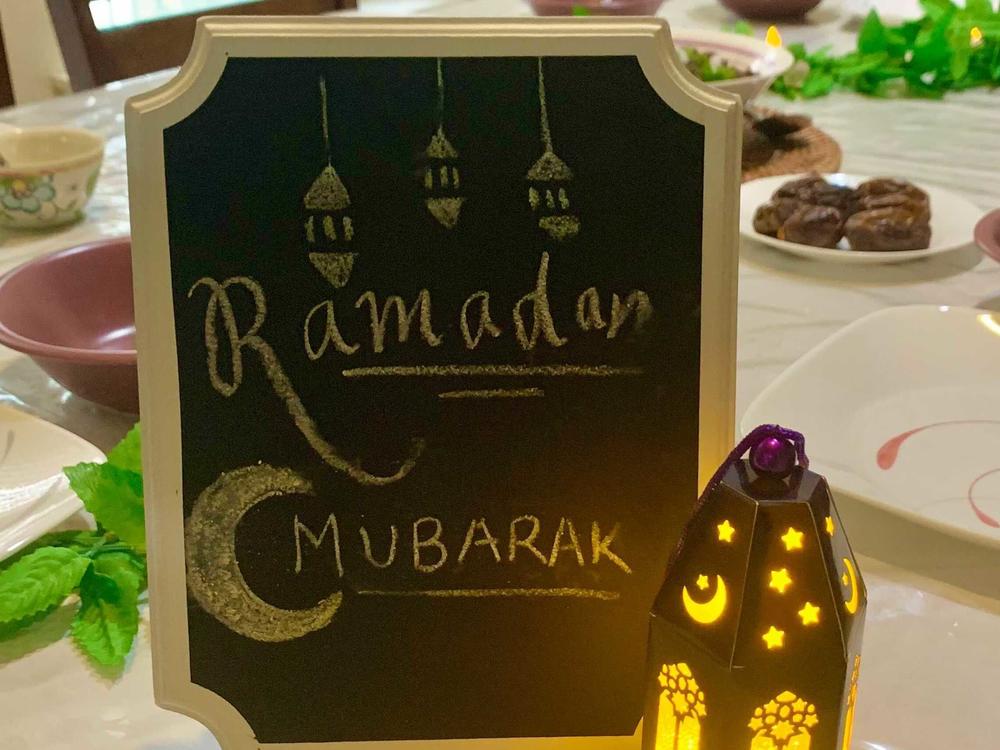Section Branding
Header Content
Muslim Americans Reflect On Another Ramadan During The Pandemic
Primary Content
Safiyah Zaidi, 21, has always enjoyed celebrating Ramadan. Growing up in a Muslim household, she considers the month, when Muslims fast from dawn to dusk, to be the best time of the year.
"You see all the friends that you normally don't see throughout the rest of the year, and there's food, there are lectures ... and just a real sense of community," Zaidi says.
Zaidi says it feels surreal to be spending another Ramadan at home due to the COVID-19 pandemic, but she wants to make the most of it.
"One thing that's important that we did this year, not last year, is we did a lot of decoration," Zaidi says. "I think that that's very important to have a physical reminder that you're now in the month."
On Tuesday, April 13, Muslim communities across the U.S. started fasting in their second Ramadan during the pandemic. Last year, Ramadan was early on in the pandemic starting on April 24. So many events, including mosque prayers and iftars, the evening meals that break the fasting of each day, got canceled or switched to virtual. Although mosques and community organizations are continuing to create virtual events this year, some Islamic centers are holding in-person prayers. Muslim Americans are also reflecting on how the pandemic altered their fasting experiences.
While the communal aspects of Ramadan are essential to the experience, the month is also centered on charity, worship, and developing empathy and connection to others, according to Tom Cloyd, 66, a council member on the governing board of the Islamic Center of Brushy Creek in Cedar Park, Texas.
"We've really pushed hard this year to get a lot done," Cloyd says.
The center is hosting a variety of virtual events and lectures to appeal to different parts of the community. During the weekend, they have talks that are led by and centered on Muslim women. On Sundays, they hold youth-focused events.
"We started doing a community iftar via Zoom," Cloyd says. "We had just started last night and we had 45 people log on."
The mosque is holding in-person prayers at a low capacity and abiding by other guidelines set by the Centers for Disease Control and Prevention. Everyone has to bring their own prayer rug, and they are implementing social distancing and a reservation system. They also sometimes use outdoor space as well to accommodate the numbers.
"They [people] want to be together. This is a time of community and people being together," Cloyd says.
But there's still a sense of uncertainty due to the pandemic. Ridhwan Sediqe, 23, who is usually based in the Bay Area, but is spending Ramadan this year with his family, says that he will hold off on attending in-person prayers at his mosque this Ramadan.
"The good thing is that our masjid [mosque] is live streaming so you can try to follow along," Sediqe says.
"I am trying to have the mindset of engaging with how folks are doing it in other spaces, like setting up WhatsApp groups where we keep each other on task about our progress with trying to do ... virtual reading circles."
Meanwhile, Zaidi is excited about the prospect of her mosque possibly holding in-person prayers. Last year, it was challenging for her to attend countless virtual events on Zoom.
"There was a feeling of the connection not being as strong, as intense," she says. "You couldn't make eye contact with the person giving the lectures."
Connecting spiritually during Ramadan
Luma Khabbaz, 24, who is based in Chicago, found that fasting during the pandemic has made her appreciate having a quieter Ramadan and the opportunity to spend more time with her family.
"I would rather celebrate and observe it. ...with my close family. I think there is such a fun camaraderie that is going to dinner parties, but you kind of lose track of the days like that," Khabbaz says.
She also feels that she is able to connect more spiritually. Usually, she would attend the mosque for Tarawih, which are night prayers that Muslims observe during Ramadan, and listen to the Imam read the Quran during the prayers. But she instead read passages by herself last year.
"Something that I was finally kind of able to do is read Quran by myself in that setting where I felt like I was leading my own prayer," she says.
Stripping Ramadan out of its more social and "fun" elements has helped her reaffirm her spiritual commitment.
"This is the ultimate test for me, the fact that when there is no one here to keep me accountable, I am fasting, I am studying," she says. She is also excited about spending more time cooking. Khabbaz grew up eating Syrian food, but she plans to experiment with recipes from other cuisines.
"I'm going to try to step it up," she says. "Usually I'll just make something to eat, but maybe I'll make an appetizer or a dessert."
Hope of a more "normal" Ramadan
To many Muslims who are now vaccinated, there is more to look forward to this year than last Ramadan. Sediqe says that he is excited to go to iftar picnics with his friends, who are also vaccinated.
"I think it's definitely not going to resemble anything pre pandemic," Sediqe says.
"But I think it's enough of a reminder of what that space looks like that I can hold on to that and use that as something satisfactory."
Zaidi also plans to meet with other vaccinated friends safely and in small groups for potlucks.
"We feel safe and secure enough because a lot of us live with elderly grandparents, so it's important that you have that security," Zaidi says about being vaccinated.
Zaidi says that the pandemic changed her perception of Ramadan as an experience. "It's almost a very pure reflection of what the month is meant to be about, because it's a month of collectivism and community," she says.
"What better way to safeguard your community than to make sure that everyone is safe and healthy."
Copyright 2021 NPR. To see more, visit https://www.npr.org.



